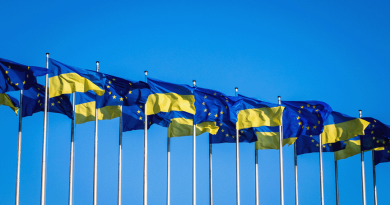Re-joining trade with antitrust
Cristina Caffarra is an Honorary Professor at University College London, and Burcu Kilic is a CIGI Senior Fellow
The challenge to the neoliberal paradigm that has upended antitrust thinking in the US over the past five years has started to affect US trade policy. The two have operated quite separately over the last few decades in the US, although they shared a neoliberal paradigm that privileged a focus on efficiency and lower costs/prices.
The common connecting tissue was a view that if we eliminate barriers to the movement of capital and goods, production will migrate to places with competitive advantage (lower cost) and consumers at home will benefit from imports of cheap goods; markets will be open and contestable and as long as entry is possible, concentration will deliver efficiencies and lower prices, which again benefit consumers.
We know how the story really unfolded, the telling amplified by the pandemic, war, energy crisis, and ensuing inflation. Capital and goods can move fast, people don’t – so globalisation often meant impoverishing communities at home which did not end up benefiting from ‘trickle-down’ growth theory (Rodrik 2011).
Antitrust was captured by a pro-corporate efficiency paradigm which assisted concentration across the economy and forgave all sort of conduct that squelched, maimed, or simply bought up any challengers.
The major shift that has taken place over the last few years is that antitrust has been substantially redirected, at least in the US, from caring for ‘consumers’ (a narrative now almost synonymous with corporate interest) to a focus on ‘citizens’ (workers, farmers, small businesses, communities), with an explicit ‘antimonopoly’ agenda.
And this fundamental shift in antitrust posture and focus is also leading to ‘trade orthodoxy’ being challenged from within. US Trade Representative Katherine Tai has been calling out the “idolization of efficiency in trade” and started to join the dots with a notable speech in June 2023.
At a recent major antitrust conference in Brussels, she went further: “the change vectors we are grappling with in trade are the same you are grappling with in antitrust. The free trade paradigm of the last few decades was built on a fixation for maximizing efficiency, and liberalization of trade became an end in itself, perpetuating a race to the bottom: cutting costs, exploiting people and planet. Just as antitrust has been detaching from the consumer welfare standard, we need to think about the humans in the economy as not just consumers. They are also workers. We cannot pursue policies to benefit people as consumers if those are impoverishing people as workers.”
Further, “the injection of public interest is also a big theme in trade, we are breaking out of the proxy that what is good for the biggest corporate stakeholders in our system equals what is good for America and Americans as a whole – we’ve seen over time that just isn’t happening.”
This is a major change of direction at US Trade, reflecting a recognition that the antimonopoly battle at home should not be contradicted or undermined by trade rules that for too long have been designed by the same leading US corporations, and shaped to benefit them.
But also a recognition that in a connected world where every country should be an equal at the table, trade rules that are made by Global North corporations to benefit owners of capital and data are harmful to global efforts to protect fundamental rights, reduce inequality, and democratise economic opportunities.
That this is a hugely controversial position that antagonises large US giants and their lobby has become apparent from press attacks on Tai’s USTR, accused of being influenced by progressive advocacy groups and of betraying America’s corporate interests.
The most sensitive area at the moment is data and digital trade, where prodding the interests of Big Tech (Kilic 2021) caused a major backlash. Before expanding on that, we set out a few more general considerations on why universal antimonopoly values should also have a foundational role in trade policy.
Antimonopoly values in trade
The post-neoliberal rethink of antitrust in the current US administration (the ‘neo-Brandeisian’ vision), with a focus on targeting corporate power per se, has been a major transformation in US economic policy, extending to multiple areas (the ‘all of government’ approach) and reverberating across the world.
After two decades under the permafrost, US antitrust regulators in the current administration are sending an aggressive message about the democratisation of antitrust: not a technocratic pursuit by a selected church of lawyers and economists advancing the interest of corporate power, but a broad effort to pursue the interest of citizens (not just consumers, but workers, small businesses, farmers).
The ‘Washington consensus’ for dealing with developing countries (essentially prescriptions dating back to the late 1980s for opening them to the global marketplace) has also been engulfed in the post-neoliberal bonfire. The WTO, the multilateral body that is supposed to achieve consensus on trade rules and is (in theory at least) the traditional home of free trade, is currently in turmoil with deep divisions and major ideological disagreements between free trade faithful, those contemplating the failures of the free trade paradigm, and everything in between including deep lobbying by corporate interests.
At a minimum, it seems important to recognise that in an increasingly fractured world, with concern about trade barriers on the rise, free trade has not always been in the interest of people but often a tool to extend corporate power and shape markets globally in ways that benefit dominant corporations and are not democratic or pro-citizen (Stiglitz 2006, 2008). The relationship between trade and competition requires much deeper reflection and understanding.
The Global South in particular has been on the receiving end of free trade rules shaped by the Global North which have sculpted their domestic markets. Given the wide disparities in growth and development levels, negotiations on trade agreements have tended to take place on an uneven footing, with ‘linkage bargaining’ (Ryan 1998) around unrelated issues at times aimed to get these countries to agree to rules that benefited multinational companies – for instance, stricter intellectual property protections in the WTO’s Agreement on Trade-Related Aspects of Intellectual Property (TRIPS) and other US trade agreements1.
Eliminating trade barriers has also meant that powerful corporate interests could establish themselves, create first-mover advantages in developing countries, suffocate local competition, oppose domestic regulations, create persistent concentration, and leave local regulators to deal with a mess of abuse and strong-arm tactics, supported by armies of lawyers.
This has been the case across multiple sectors from agriculture to chemicals to pharmaceuticals to e-commerce and digital markets. Pursuing the free trade interest of corporate giants is not without consequences on people and the planet, both abroad and at home, and at odds with explicit antimonopoly policies at home.
This is the sense in which trade should not be philosophically and practically siloed from antitrust thinking. In a world where efficiency has been dethroned as the dominant value in antitrust, we should also be clear about what trade policies that appear to pursue free trade in the name of efficient outcomes can do.
An instructive example is digital trade, the focus of much recent agitation by Big Tech, since USTR withdrew its support for some controversial digital trade rules advanced by the previous administration at the WTO’s Joint Statement Initiative talks in October 2023. USTR argued that the US needed to re-evaluate its position on these rules in light of rapid changes in technology – for example, artificial intelligence capabilities (Kilic 2024).
The outcry of Big Tech around the issue has been reflected in much adverse press coverage and accusations that USTR is captured by progressive thinking. In practice, African countries have meantime agreed to those same rules USTR withdrew amongst themselves in the African Continental Free Trade Agreement (AfCFTA) Digital Protocol (Gathii 2024), reflecting the ability of these corporations to ‘divide and rule’, pressing their preferred outcomes in multiple venues.
This is instructive of how dominant US companies continue to use their lobbying influence to extend their power abroad, and why we need to join the dots much better. If antimonopoly is an overarching value (and it should be), then it needs to be threaded consistently across areas of policy. We expand further on the digital trade battle below.
It seems important to recognise that in an increasingly fractured world, with concern about trade barriers on the rise, free trade has not always been in the interest of people but often a tool to extend corporate power and shape markets globally in ways that benefit dominant corporations and are not democratic or pro-citizen
Why is digital trade a focal point for an antimonopoly vision?
For Big Tech companies which aim to operate on a global scale, the world is the stage and expanding reach and influence across countries a key objective. While the US is still the largest and most profitable market, establishing the surveillance business model across continents and countries with rapid demographic growth is essential to entrenching their position into the future.
This is why free flows of data across borders and rules on server locations are so important: if data flows were restricted, the ability to operate with no constraint would be reduced and the opportunity to exploit the world’s data for profit would be contained. Except voices from around the world are increasingly asserting their presence and demanding a re-evaluation of trade norms around this issue.
Since 1998, the WTO has implemented a ‘temporary’ moratorium on customs duties on digital transmissions. The moratorium has made it easier for data, entertainment, and digital goods to cross borders without taxes. Back when this rule was set, trade in data was a novel idea and the focus was on favouring the development of e-commerce.
But now digital trade has grown to include not just digitally enabled services but also the trading of data and digital assets like personal information, data sets, algorithms, and models. This raises issues from protecting privacy and safeguarding democracy to addressing surveillance capitalism and fostering digital development.
These issues are also very salient in the Global South – for instance, a trade policy with a zero tariff (a moratorium) on digital flows is what allows tech companies to avoid establishing operations in a country and export the data, telling regulators they do not have jurisdiction when challenged. It is what allows them to locate all their profits in places like Ireland or Bermuda where they pay low or no tax, with serious consequences for social and economic justice.
Developing economies have become increasingly vocal about the need to have a plan for reflecting their economic interests in a meaningful outcome, rather than a rote extension of the moratorium. The WTO Ministerial Conference in Abu Dhabi just extended it for one last time until 2026 at the eleventh hour, but the issue is firmly on the table.
Meantime in the US, USTR is now participating in President Biden’s Competition Council as part of a coordinated effort to improve resilience and tackle excess market concentration, and the connection has been formally made that trade agreements have a role in the global digital governance landscape.
Recognising the inadequacies of trade governance to tackle the complexities introduced by digital technologies and AI, USTR also revised its positions on data flows, server locations, trade secret protections for source code and algorithms and non-discrimination at JSI talks in 2023 (Kilic 2023).
It cited the need to create ‘policy space’ for the US Congress and the administration to craft proposed rules more consistent with the effort against tech monopolies at home. The administration also issued an Executive Order prohibiting data transfers to China and ‘countries of concern’ on security grounds.
Where is Europe in all of this? There is inevitably suspicion of the US late ‘conversion’. European officials have long grappled with the tension between trade agreements and digital governance, a challenge they understand is intensified by surveillance capitalism. Surveillance capitalism has long presented a major problem for European trade negotiators trying to uphold the EU’s strong data protection standards in European trade agreements.
In 2018, the EU adopted horizontal provisions on crossborder data flows, data protection, and privacy for its bilateral and multilateral trade agreements, affirming a strong commitment to EU data protection rules and fundamental rights (Yakovleva and Irion 2020). Yet these provisions have not received the support they deserve.
Although established as a non-negotiable redline, the EU first retreated in its agreement with the UK (Scholte 2021) and more recently with Japan, raising questions about the resilience of EU policy space (European Data Protection Supervisor 2024).
It would be undesirable for the EU to step back just as the US appears to be moving closer; especially as the US appears to be doing so not in the pursuit of the usual US corporate interests but of a more deserving vision that could benefit citizens in the Global North and South alike.
Seriously joined-up thinking that pulled together the fight against digital extractive business models, sovereignty for data and infrastructure, and trade posture should be an achievable goal for the new European Commission mandate.
More broadly, trade is not an island and antitrust is not an island. Trade rules shape markets and understanding the antitrust implications needs to be part of a discussion where the Global South (whose interests are in fact aligned with that of citizens in the North) has a major role to play.
Endnote
1. All US FTAs signed in the past 20 years have required trading partners to enact intellectual property (IP) laws that are stronger than those required by TRIPS (Palmedo 2021).
References
Bradford, A and AS Chilton (2021), “Regulating Antitrust Through Trade Agreements”, 84 Antitrust Law Journal 103.
Caffarra, C (2023), “Europe’s Tech Regulation is not an Economic Policy”, Project Syndicate, 11 October.
Caffarra, C (2024), “Antitrust and the Political Economy, Part 1 and Part 2”, VoxEU.org, 5 January (available here and here).
Gathii, JT (2024), “The AfCFTA’s Digital Trade Rules are Not Fit for Africa”, African International Economic Law Network, 20 February.
Kilic, B (2021), “Big Tech’s End Run around Domestic Regulations”, Heinrich Boll Siftung, 19 May.
Kilic, B (2023), “Washington Takes a Step Toward Greater Openness in Digital Trade”, CIGI, 16 November.
Kilic, B (2024), “As Global Trade Goes Digital, Trust Becomes Critical”, CIGI, 29 February.
Palmedo, M (2021), “A Strict IP Rule in US Free Trade Agreements is Associated with Higher Drug Prices in Importing Countries”, Boston University Global Development Center, 21 April.
Rodrik, D (2011), The Globalization Paradox: Democracy and the Future of the World Economy, WW Norton.
Rodrik, D (2018), “What Do Trade Agreements Really Do?”, Journal of Economic Perspectives 32(2): 73–90.
Rodrik, D (2021), A Primer on Trade and Inequality.
Ryan, MP (1998), Knowledge Diplomacy: Global Competition and the Politics of Intellectual Property, Brookings Institution Press.
Scholte, D (2021), “EU Data Protection in Trade Agreements”, KSLR EU Law Blog, 26 April.
Stiglitz, JE (2006), “It takes more than free trade to end poverty”, Independent, 3 February.
Stiglitz, JE (2008), “Fair Trade”, The National Interest 95: pp. 19–24.
Yakovleva, S and K Irion (2020), “Pitching trade against privacy: reconciling EU governance of personal data flows with external trade”, International Data Privacy Law 10(3): 201–221.
Zuboff, S (2022), “Surveillance Capitalism or Democracy? The Death Match of Institutional Orders and the Politics of Knowledge in Our Information Civilization”, Organization Theory 3(3).
Authors’ note: The authors have no conflicts of interest on the matters discussed in this column. This article was originally published on VoxEU.org.




